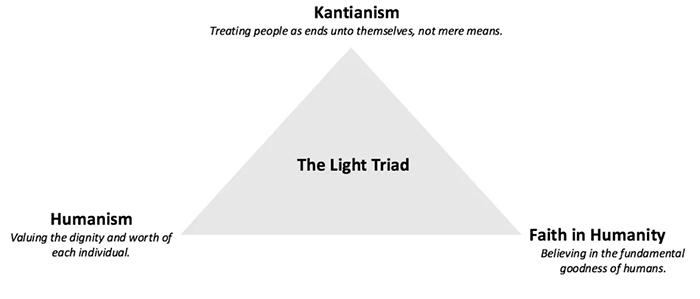The idea of balancing forces comes up again and again in our society, from the idea of yin and yang to any one of the growing number of Star Wars movies. Now scientists have identified three key positive motivations that drive us, and they're calling it the Light Triad.
There's already a widely recognised Dark Triad – three important impulses that can drive us towards bad behaviour, namely psychopathy, narcissism, and Machiavellianism (manipulativeness).
What the new research does is provide a triple counterpoint, in the form of Kantianism, humanism, and faith in humanity. The team behind the new definition says it can enable much more nuanced and balanced studies of the human psyche, opening up new avenues for research that have previously been overlooked.
"Too much focus on one aspect of human nature at the expense of the other misrepresents the full capacities of humanity," write the researchers behind the new Light Triad concept.
"What is missing in the field, we believe, are empirical investigations that include measures of the dark side and measures of the light side."
 (Scott Barry Kaufman, David Yaden, Elizabeth Hyde, and Eli Tsukayama)
(Scott Barry Kaufman, David Yaden, Elizabeth Hyde, and Eli Tsukayama)
Let's break down those three pillars of the Light Triad. Kantianism, named after the 18th century German philosopher Immanuel Kant, is concerned with treating other people as people and not using them as a means to an end.
Humanism involves "valuing the dignity and worth of each individual", according to the researchers, while faith in humanity is just that – trusting that people are fundamentally good, no matter what the news headlines or your encounters with annoying neighbours might have you believe.
To build up a Light Triad Scale (LTS) that could be used to assess character, the scientists looked at the direct opposites of the Dark Triad – quite literally swapping what makes someone a bad person with what makes someone a good person.
They then developed 12 statements to assess how far someone might lean towards the three Light Triad traits, surveying 1,518 people to test the reliability and the validity of the new scale.
The tests included statements like "I tend to see the best in people" and "I prefer honesty over charm", to which volunteers had to select a response from "strongly agree" to "strongly disagree".
The consistency and predictability of the results showed the LTS could indeed be a useful psychological measuring stick in the future, though the researchers themselves admit this is an exploratory first draft.
While the Light Triad showed a moderate negative correlation to the Dark Triad in the survey responses, the scores weren't exact opposites. In other words, there's room for a balance of both dark and light in all of us, it would seem.
The next step is to use the LTS to measure the good aspects of human character in future research – to explore the positive side of our nature just as the Dark Triad has been used to measure the negative. It can help identify "everyday saints" according to one of the team, Scott Barry Kaufman from the University of Pennsylvania.
"I'm talking about the person who, just by their being, shines their light in every direction," writes Kaufman. "The person who isn't constantly strategic about their giving, but who emits unconditional love naturally and spontaneously because that's just who they are."
If that sounds like you, or the complete opposite, you can take the Light Triad Scale test yourself here to come out with a score (and possibly a corresponding movie character).
Other interesting findings from the research included the correlations for each triad. The Dark Triad was positively correlated with being younger, being male, and being motivated by power, but negatively correlated with life satisfaction, compassion, and empathy.
The Light Triad, on the other hand, was positively correlated with being older, being female, and having higher levels of spirituality and religiosity. These people reported more satisfaction with relationships and higher feelings of competence and autonomy.
There's likely much more to come from the Light Triad Scale, but for now it seems set to be a very useful tool for measuring the more positive aspects of what makes us all tick – psychological tests like these can come in useful in all kinds of ways.
"We hope our research helps balance the force in personality psychology," writes Kaufman.
"Yes, everyday psychopaths exist. But so do everyday saints, and they are just as worthy of research attention and cultivation in a society that sometimes forgets that not only is there goodness in the world, but there is also goodness in each of us as well."
The research has been published in Frontiers in Psychiatry.
